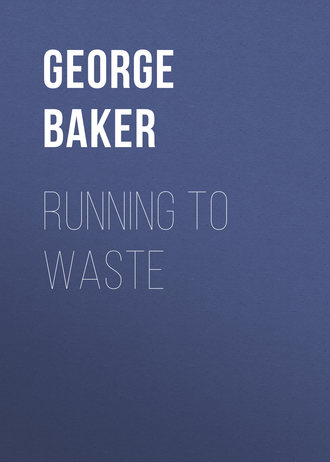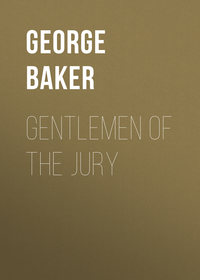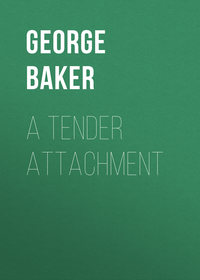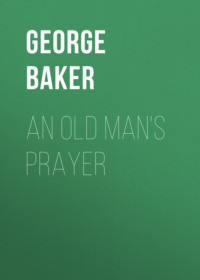 полная версия
полная версияRunning To Waste
To the utter astonishment of the captain, when they reached the house, a transformation had been accomplished. On a block in the yard sat Teddy, with a clean face, smoothly-brushed hair, clothes well patched, to be sure, but without a rent, and, strangest of all, shoes and stockings on his feet. Becky sat in the doorway, with an open book in her lap, hair well brushed and curled, frock mended, clean apron, polished shoes, and white stockings. All this was the work of Hulda Prime. Either in gratitude to Mrs. Thompson, who had quickly returned the purloined goodies, with the request that the children be made presentable, or from a desire to astonish her enemy, Hulda had risen at an early hour, aroused the sleepers, washed, brushed, and mended with an energy that surprised even the dreamy mother, and, after a lesson in good behaviour, had set her charge out to dry, until the arrival of the captain.
Becky had taken the matter very coolly. When told she was going to school that day, she said, —
“Why, Teddy and I were going up to the Basin to-day.”
“Yes, rafting,” said Teddy. “It’s plaguy mean to spoil a fellow’s fun.”
“No matter,” replied Becky, with a knowing nod of the head; “guess we’ll go after school, any way.”
When thoroughly scoured and adorned, she took a large book, and sat in the doorway, where the captain found her.
“Well, young ones, what is it – peace or war? Will you go to school quietly, or must we drive you?” said the captain, when he had recovered from his surprise.
“You won’t drive us, captain,” said Becky, looking up, with a smile. “It would be too hard work. We’re going quietly – ain’t we, Teddy?”
“Yes, if we’re let alone. Ain’t going to be lugged like a calf to the slaughter-house, any way,” grumbled Teddy.
“You’d better,” growled the captain. “I ain’t forgot your capers in my orchard. I’m just itching to pay off that score. But I’ll call it square if you give me no trouble now.”
“All right, captain,” replied Becky; “We’ll go. I’ve been preparing myself for torture in this blessed book.”
“What book’s that – the Bible, hey?” said the captain.
“It’s ‘Fox’s Book of Martyrs,’ captain; but I can’t find anything about school in it.”
“Pshaw!” said the captain; “let such books alone. Come, stir your stumps, or you’ll be late. Now, recollect, if you give me any trouble – ”
“Cap’n Thompson, you needn’t be afraid of them young ones; they won’t eat you!” cried Aunt Hulda, sticking her head out of the kitchen doorway. “If you and that big Irish lubber can’t handle ’em, better call on the committee; they’ll help you.”
The taunt was so bitter that the captain raised his whip; but, recollecting the sex of his opponent, he turned away, with a muttered “Hang it!” and strode into the road. Teddy and Becky followed, and Phil brought up the rear. The march schoolward was devoid of stirring incidents. Occasionally Becky, annoyed at the strict guard kept over them, would dart to the side of the road. The captain and Phil would run after her, only to find her picking a flower, or cutting a switch. The captain would stalk on again, and the captives would exchange mischievous glances, while Phil would grow red in the face with suppressed laughter.
The captain had consumed more time than he intended in mustering his recruits; and it was past nine o’clock when he reached the school-house. His “chicks,” having exhausted their stock of cheers, had filed into the school-room, and not averse to Phil’s recommendation, had indulged in a noisy but good-humored frolic, in which they were joined by some twenty later arrivals. They were in the midst of an animated game of tag, when three distinct raps upon the teacher’s desk made them aware of the presence of a stranger. In an instant there was profound silence in the room, and all eyes were turned upon the new-comer. He was a young man, of medium height, broad-shouldered and full-chested, every movement of his person showing in its powerful grace the effects of physical culture and out-door exercise. His face was equally powerful; piercing black eyes, browned skin, and a determined lock of the under jaw, showed a strong will and a daring spirit. Yet an occasional comical quiver about his eyes, and a lifting of his slight moustache by a half smile, and a genial glow of good humor which beamed through its sternness, as the ruddy cheek glowed under the brown coating, gave token of the nobility of power, by its kinship to gentleness and good humor. To all this were added a high forehead and an abundance of short, curly locks, so that the person of the stranger was not only calculated to command respect, but admiration as well.
“My young friends,” said he, “I bear a message from your teacher. He was taken suddenly ill last Friday night; he is somewhat better this morning, we think, but unable to be here with you. He has asked me to take his place, and wishes you to be patient with one who is a new hand at keeping school. That’s myself,” with a smile. “Will you take me?”
“O, yes, sir!” “Yes, sir!” in full chorus.
“Very well. I think we can agree. Take your places – boys on the left, girls on the right, as usual.”
There were three rows of forms on each side, for the scholars, with a broad open space between; there was a platform at the farther end, for recitations; the teacher’s desk faced this, on a corresponding platform at the left of the door, and behind his desk was a blackboard affixed to the wall. The room was lighted by three windows on each side, and one at the farther end.
The scholars quickly took their places, and Mr. Drinkwater’s substitute seated himself at the desk, opened the record book, and commenced calling the names of the scholars of the last term in alphabetical order. He was among the D’s, had reached the name of Hosea Davis, when the door was thrown open, and Captain Thompson stalked into the room, followed by Becky and Teddy.
“Here Drinkwater, here’s a couple of eels that want training.”
The substitute raised his head quickly.
“Harry Thompson!”
“Yes, sir, Harry Thompson,” said the stranger, rising. “I hope I see you well, sir.”
The captain did not look well. He turned pale, and stared at his son as though he could not believe his eyes.
“Wh-wh-what does this mean? Why are you here? Where’s Drinkwater?”
“Mr. Drinkwater is ill, sir; taken suddenly last Friday. I have been stopping with him for a few days, and he requested me to open his school to-day.”
“He’s no business to do anything of the kind. This is my school; and I won’t have it.”
The captain was getting angry.
“I understood him to say that the school-house was leased to him, and that he was expected to get a substitute when unable to attend himself.”
“So he is; but not you, sir, not you. I don’t want any of your teaching. S’pose you’ll teach these young ones to disobey their fathers, and run off. No, sir. You are at liberty. I’ll teach myself.”
“That is a point you must settle with Mr. Drinkwater,” said the young man, quietly. “I have taken command here, and, without meaning to be disrespectful, propose to hold my position until relieved by Mr. Drinkwater.”
The captain absolutely foamed with rage.
“You’re an impudent puppy. You’ve no business here, no business in the place. You’ve disgraced yourself. After what I’ve done for you, too!” And the captain went into particulars as to what he had done, commencing a long way back in the young man’s history, and without giving his son a chance to speak, growing louder and fiercer as his tongue flew the faster. He was suddenly brought to a stop by a roar of laughter from the children. He turned to them in amazement, but not by him was their merriment caused.
While the captain was giving vent to his troubles, Miss Becky had stepped upon the platform, picked up a crayon, and commenced operations on the blackboard. As she proceeded, all eyes, with the exception of those belonging to the captain and his son, were fastened upon her; and the completion of her picture had brought forth the interrupting roar.
Becky had one talent which had long been hid; she had a genius for drawing; but never before had this peculiar talent been paraded for public inspection.
But here, as skillfully executed as chalk would allow, was a drawing representing “Old Uncle Ned” at full gallop, Becky seated upon his back, and the captain in full pursuit – so well done, that the captain, following the direction of all eyes, instantly recognized it. Incensed he made a dart at Becky; but the nimble artist dodged him, and fled to the farther end of the room. This produced another roar from the scholars. The captain checked his pursuit, turned about, and fled from the room, banging the door behind him.
Harry Thompson rapped the desk, and commanded silence.
“Miss Becky Sleeper, remove that drawing from the blackboard at once,” he said sternly.
Becky looked up at him with a mischievous smile, which instantly disappeared, as she met his eye. She meekly obeyed, and the picture vanished.
“Now, take your place. You, too, Master Teddy.”
Teddy went over among the boys, and Becky followed him. Another roar from the scholars.
“Silence!” from the teacher. “Miss Becky, you will take your place among the girls, where you belong.”
Becky went the whole length of the room, scowling at the girls, who had laughed at her blunder, and took a seat by the window.
Harry concluded his record by affixing the names of Teddy and Becky, who were the only new scholars.
“The exercises will be very short this morning, and there will be but one session. I shall only call upon you to read; that concluded, you will be dismissed for the day.”
He then commenced with the boy nearest him, calling upon them separately to read – first a boy, then a girl, in regular succession. They made their own selections, and with varied success. There were some good readers, none very bad, until they reached Teddy. He stepped upon the platform, and read “Casabianca” somewhat in this style: —
“‘The boy stood on the – b-u-r-n-i-n-g – burning deck,Whence – whence – whence all butim had sled – no, fled;The flames that lit the batil wreckShine – shown – show – round him o’er the dead;’”which, of course, excited a laugh. It was now Becky’s turn, and she was called. She did not move. She could read no better than Teddy, and she was determined not to be laughed at.
“Becky Sleeper, take the platform!” said the teacher, in a stern voice.
“I won’t – there! I didn’t come to school to you: Mr. Drinkwater’s my teacher.”
Harry Thompson stepped from his desk. The lower jaw came up with an ominous snap. He went to where Becky sat kicking the form before her, and looked down at her. She appeared so little, that his anger at her sauciness vanished at once.
“Becky, you and I will have a private session after school. You will read to me then, I think, for old acquaintance’s sake,” he said, with a smile, and returned to his desk. “I am very much obliged to you all for your attention. School is dismissed. Becky Sleeper will remain.”
There was a rush for out doors, and the school-room was quickly cleared of all but Becky and the teacher. Teddy had lingered a moment to exchange a word with Becky, in which “the Basin,” and “wait outside,” might be distinguished, and then had taken his leave.
“Now, Becky, let me hear you read.”
Becky arose, but instead of stepping to the platform, marched straight for the door. But not quite fast enough, for Harry stepped before her, closed the door, and locked it.
“Becky,” said he, “the first duty to be learned in school is obedience to the teacher. Go to the platform!”
Becky looked up at him with defiance in her glance.
“Harry Thompson, you’re just as mean as you can be. You let those boys and girls laugh at Teddy and now you want to laugh at me. I won’t read.”
“Go to the platform.”
Becky turned and went to the platform, and farther yet; she threw up the window, and jumped upon the sill, and all very quickly. Harry saw her intention at once.
“Becky, Becky, don’t do that,” he cried, running towards her. “It’s ten feet. You’ll break your neck.”
“Don’t care. I won’t read;” and she leaped. There was a rustling and tearing among the foliage beneath the window; but when Harry reached it, Becky was invisible.
CHAPTER VI.
BECKY’S LAST FROLIC
Teddy Sleeper obeyed Becky’s injunction to wait outside, by passing round school-house, and down the hill, to the window at the end, that he might be in readiness should she desire to signal him during her confinement. He was just in time to witness her descent. She plumped into a cluster of bushes, and for a moment was lost to sight. Even this terrific leap did not surprise the phlegmatic Teddy, who had such an exalted opinion of his sister’s prowess, that, had she jumped from the steeple of the church, he would have expected her to pick herself up as coolly as she did now, emerging from the bushes with ruffled plumage, but without a scratch or bruise.
“Well, Becky, got out sooner than I thought you would. Did he make you read?”
“No, he didn’t,” replied Becky, with a sneer. “It will take a smarter teacher than him to make me do what I don’t want to. He’s nothing but a boy.”
“What will the captain say now, Becky?”
“I don’t care what he says. Guess he don’t like the teacher any better than I do. Come, let’s get away from here; he’ll be after us.”
“That’s so. Where shall we go?”
“Where we were going this morning. We’ve got time to ‘shoot the Basin’ before dinner.”
So saying, Becky, whose hasty exit from the school-room had not allowed her to gain possession of her hat, started off bareheaded, followed by Teddy, along the bank of the river, towards the Corner.
Harry Thompson inherited a streak of the obstinacy which was so apparent in his father. As Becky disappeared from one side of the window, he rushed from the other, caught up his hat, unlocked the door, and hastened down the hill, only to see his unruly pupil climbing a fence twenty rods away. This convinced him that no bones had been broken. But he was not inclined to let the matter drop here; so he returned to the school-room, made all secure, and then started in pursuit.
As he moved along the bank of the river, the leading event of the morning was uppermost in his thoughts. The appearance of his father in the school-room had not been unexpected, and the explanation he had given of his own presence there was perfectly true. Mr. Drinkwater was ill, and had sent him as a substitute. Harry, who was well acquainted with the new school-house affair, had, after consultation with his mother, who visited him daily at Mr. Drinkwater’s residence, where he was domiciled for the express purpose of meeting her, accepted the position that he might try the temper of his father, and pave the way to a reconciliation, if that were possible. He was quietly awaiting the conclusion of the captain’s vehement review of “what he had done for him,” when he expected to have an opportunity to say a word in his own defence; but Miss Becky’s exhibition of chalkotype art interrupted the contemplated plea, and sadly disarranged his plans. His only consolation was, that Mr. Drinkwater would not be able to take charge of the school for several days, and another meeting might be possible.
Becky, in her turn, occupied a share of his thoughtful attention. He had looked forward with pleasure to the meeting with his little playmate, fully expecting that the years which had wrought so much change in his character, would have shaped the little maid, of whom he was so fond, – with her quick wit and active spirit, – into something better than the hoiden he found her. Her saucy movements, her rough appearance, and her rudeness, had startled him; but, remembering the influences by which she was surrounded at home, and the artistic touch displayed at the blackboard, he was convinced that in that little body were capabilities running to waste, which, trained aright, might blossom into usefulness. If his good mother only had the trailing of this wild vine, it would flourish in fruitfulness, and not cumber the ground. It was not yet too late. He would take his mother into his confidence.
Full of thoughts like these, Harry went on, keeping a sharp lookout for the runaway, until he reached the paper-mill at the Corner. Here he was informed that the young Sleepers had gone farther up the river’s bank. Undecided whether to go on or retrace his steps, he passed into the mill, and, meeting his old friend, Mark Small, went over the building with him, viewing the improvements, in which he became so much interested that he quite forgot the object of his expedition.
In the mean time, Becky and Teddy had, after a long tramp, and with no small vaulting of fences and climbing of rocks, reached the Basin.
Rogue’s River, the base of Becky’s future operations, was dammed at three points. The lower dam was at the fore side, the middle dam just above the school-house, and the upper dam at the Corner. Here was located Small’s paper-mill, not a very extensive affair, but which employed a dozen men and as many girls. In the middle of the river, about a quarter of a mile above this mill, was a small island, scarcely twenty feet in circumference, on which flourished a wild growth of unproductive bushes, with one solitary sentinel of a tree in their centre; and above this was the Basin. Into this basin, after a winding flow of ten or twelve miles, increased by several minor streams, the water poured with considerable power. It lay in the form of a heart, so often depicted on valentines, or moulded in sugar for the sweet-toothed. It was about thirty feet from bank to bank, and about the same distance from the point of entrance to the island, which shooting into it, gave it a resemblance to the emblem of affection. Divided by this island, the water swept along on either side in strong, swift currents. When Harry Thompson, as leader of the boys of Cleverly, had exhausted all the known means of amusement, his daring spirit suggested a difficult feat, calculated to carry dismay to the hearts of his followers, and cause uneasiness to those parents who had an interest in the safety of their children. He not only suggested it, but himself performed it, and succeeded in inducing a few of the boldest to follow his example. This feat was known as “shooting the Basin.” Into the winding river he launched a log, of which there were many lying along the banks, a mill hand being employed at this point to draw them out of the stream. Upon this he stepped, with a long, narrow strip of board to serve as a rudder, with which to guide his craft. The force of the stream swiftly carried him into the Basin and towards the island. It was only necessary to keep “her head” straight, and the island was reached.
He accomplished the feat, well knowing the danger he incurred; for, had his craft swerved either to the right or left, he would have been capsized or carried down the river. Of course there could be no returning in the same manner. But, to prevent his becoming a Robinson Crusoe, a tree on the bank was felled so as to bridge the stream from the bank to the island; and there it had remained ever since.
Becky Sleeper, having seen Harry perform this feat, had desired to undertake it; but Harry had strongly objected, and the tomboy, having accepted him as a leader, was obliged to postpone the attempt.
Some recent conversations on old sports between Teddy and herself had awakened a desire to attempt this feat, and a trip to the Basin had already been arranged for Monday, when the school programme was promulgated.
The short session, and Becky’s escape, had made the old arrangement possible; and the young Amazon and her faithful squire were now on the banks of the upper stream, after a quick march, ready to launch their barks upon the tide, careless of consequences.
“Now, Teddy,” said Becky, “I’ll go first: you must watch me closely, and do just as I do. You ain’t scared – are you?”
Teddy, to tell the truth, was looking rather anxiously at the rushing stream, the broad basin, and the two foaming channels beyond. The stream had been swollen by heavy rains, and the feat seemed more difficult than he had imagined before he set out.
“N-o, of course not,” he said slowly. “If you go, I’m bound to anyway.”
“Because, if you are Teddy, you’d better not try it.”
“I will try, Becky. I ain’t a goin’ to be stumped by a girl.”
“All right. But don’t you start until I reach the island; and be sure you keep your log pointed right straight at the tree.”
While speaking, Becky had rolled a short, stout log into the water, picked up a light slab, and was ready for the dash. Stepping lightly and quickly upon the log, she pushed it into the middle of the stream, headed it for the tree, and, carefully guiding her craft, shot across the Basin, and struck the island fairly and squarely.
“Hurrah! I’ve done it Teddy!” she shouted, as she leaped upon the land.
“All right; I’m a comin’. Hooray!” answered Teddy, as he jumped upon his log, which darted down the stream, Teddy dancing rather lively to regain his equilibrium, which had sustained a shock by the sudden dart of his log. He was so busily engaged in this manœuvre that he failed to head his bark as he should, and, instead of going straight across the Basin, he swept to the right.
“Teddy, Teddy, what are you about?” shouted Becky. “Turn her head! quick, quick!”
But Teddy was frightened; his log was rolling over and over, and he dropped his rudder, fell upon the log, and clasped it, with his legs in the water, and round into the swifter of the two currents it went, very near the island. Seeing his danger, Becky ran to the edge of the island, and attempted to rescue him. She leaned far over, lost her balance, and fell into the stream. Bungling Teddy clutched the bushes as he passed, let the log go, and pulled himself to land; but Becky was swept past the island, and went floating down the river.
Teddy, seeing the danger of his sister, shouted lustily for help. Two men, at work near the bank, ran down to the water, saw the struggling girl, but could afford no assistance; but they started off at a swift pace for the mill. Becky was an excellent swimmer; she was not a bit frightened, but struck out bravely in a vain attempt to reach the bank. The stream was strong and swift, and bore her on faster and faster towards the dam. Skillfully she kept her head above water, and struck out to reach Teddy’s log, which was just ahead of her. Fast as she went, the men on the shore flew faster still. It was a case of life and death. They reached the mill.
“Help, help! there’s a girl in the water!”
Men came running out, women ran to the windows; there was wild commotion, but no attempt at rescue.
“We can’t help her; she must go over the dam!”
“Throw her a rope – it’s her only chance!”
“Mighty slim chance: she’s too much frightened to catch it. She can’t be saved!”
“She can be saved! Quick! a long, stout rope!”
It was a commanding voice that spoke, a commanding form that stepped forward – the school-master, Harry Thompson. Quickly a rope was placed in his hand.
“Now, three good, strong fellows, follow me!”
He threw off his coat, ran along the bank, winding the rope around his body, and tying it as he ran. Becky was coming down swiftly, when the roar of the dam reached her ears. For the first time she felt her danger. Instantly all power of exertion forsook her. The terrible dam! the jagged rocks beneath! There was death in the thought, and a shrill scream rang over the water.
“Help, help! Don’t let me drown! don’t let me go over the dam!”
“Courage, Becky, courage. You shall be saved.”
She recognized the voice, even in her agony. “O, Harry, Harry! save me, save me!”
Still on and on she swept, and the roar of the dam grew louder and louder. It seemed to sound in her ears like thunder.
“Now, quick, boys, quick! Give me plenty of rope, and hold on strong!”
Harry Thompson kicked off his shoes and threw away his hat. Becky was moving towards him, but ten feet from the bank. He measured the distance with his eye, stepped back a few paces, then ran quickly, and leaped into the water. The best jumper in the county had well calculated his distance. He struck the water close beside Becky. He clasped her quick, she threw her arms about his neck with a scream of joy, and both sank beneath the water.









